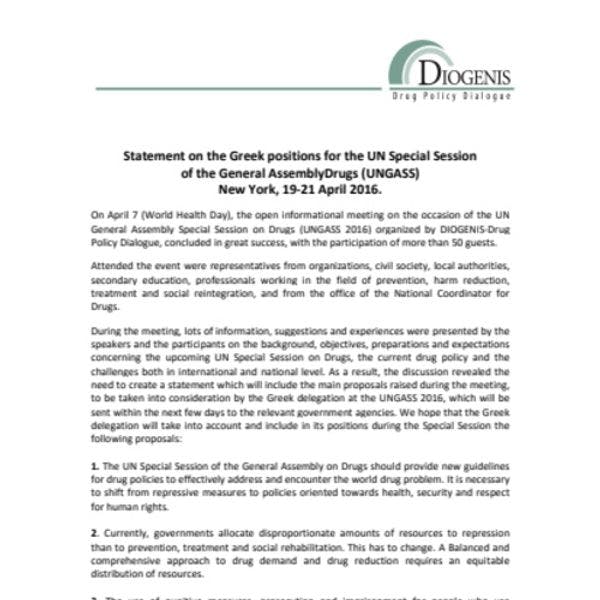Diogenis statement on UNGASS
Statement on the Greek positions for the UN Special Session of the General Assembly on Drugs (UNGASS 2016) New York: 19-21 April 2016.
On April 7 (World Health Day), the open informational meeting on the occasion of the UN General Assembly Special Session on Drugs (UNGASS 2016) organized by DIOGENIS-Drug Policy Dialogue, concluded in great success, with more than 50 participants.
The event was attended by representatives from organizations, civil society, local authorities, secondary education, professionals working in the field of prevention, harm reduction, treatment and social reintegration, and from the office of the National Coordinator for Drugs.
During the meeting, suggestions and experiences were presented by the speakers and the participants on the background, objectives, preparations and expectations concerning the upcoming UN Special Session on Drugs, the current drug policy and the challenges both in international and national level.
The meeting decided to send a text with the main points of the proposals made at the meeting to the competent authorities, who will represent Greece at the UN Special Session.
We hope that the Greek delegation will take into account and include in its presentation at the Special Session, the following proposals:
1. The UN Special Session of the General Assembly on Drugs should provide new guidelines for drug policies to effectively address and encounter the world drug problem. It is necessary to shift from repressive measures to policies oriented towards health, security and respect for human rights.
2. Currently, governments allocate disproportionate amounts of resources to repression than to prevention, treatment and social rehabilitation. This has to change. A Balanced and comprehensive approach to drug demand and drug supply reduction requires an equitable distribution of resources.
3. The use of punitive measures, prosecution and imprisonment for people who use substances promotes stigma, marginalization and has been proven to be ineffective. They should not be punished, but, on the contrary, be supported and promoted to ensure a life with dignity, respect and perspectives for social integration. Criminal sanctions for possession of drugs for personal use should be removed and be replaced by measures that promote and enhance health and social integration.
4. Cooperation among the competent service providers and law enforcement authorities is necessary in order to effectively and properly respond to people who use substances. The cooperation of all involved parties must be based on trust and mutual support.
5. It is necessary to effectively address problematic substance use and the related negative and harmful consequences, such as the spread of HIV/AIDS, viral hepatitis and other infectious diseases. The existing legislation is, in many cases, an obstacle for the implementation of harm reduction practices. Harm reduction should be legally regulated and all the related interventions, such as, inter alia, supervised injection sites, be included in the national law (Law 4139/2013 on Addictive Substances).
6. Support the abolition of death penalty for offences related to drugs.
7. The UN Special Session of the General Assembly on drugs will discuss the issue of the availability of controlled substances to treat and fight pain. The Greek delegation should strongly support the proposal for their availability. The Greek Law concerning the availability of controlled substances should be evaluated and adapted according to modern standards.
8. Cultivation and supply of cannabis for medical and scientific purposes is in accordance with the three international drug control conventions. The Greek state should legally establish the use of cannabis for medical and scientific purposes, following the example of many European countries.
9. Increase the access to medication-assisted treatment of addiction for those who need it, including access to such services in prisons and hospitals, taking also into account the specific needs of women and youth.
April 11, 2016
Athens
Click here to access the statement online.
Keep up-to-date with drug policy developments by subscribing to the IDPC Monthly Alert.
